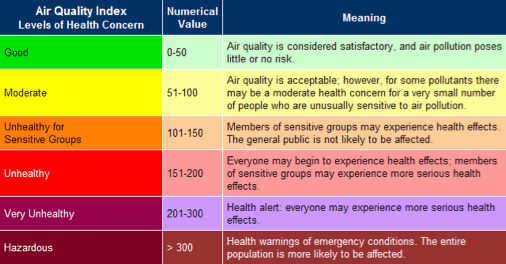"The air we breathe can sometimes be so yucky!"
Too many chemicals in the air can make you cough, or even bring on illness. This can happen in large cities with many factories and automobiles, but often the wind will blow the bad air to other areas far away from the cities. The problem is especially bad on hot days with little wind. You might see a brown or hazy sky or smell a bad smell in the air.
"The weather sometimes makes the trouble greater"
When temperatures are hot and skies are clear, ground-level ozone (also called "bad ozone") can form from industrial pollution, car exhaust and gasoline vapors. "Bad ozone" is different from the "good ozone" layer high in the atmosphere that keeps much of the sun's harmful rays from reaching Earth. Inhaling ozone can cause chest pains, coughing, nausea, throat irritation and can aggravate bronchitis, heart disease, emphysema, and asthma, and reduce lung capacity. For some people, air pollution has been known to cause heart disease and strokes.
"Pay attention to the Air Quality Index"
Fortunately, there is a way to know for sure when air quality is bad. The Air Quality Index tells us when we need to take extra precautions to avoid health and breathing problems. The Air Quality Index uses words and colors to tell us when the air is polluted. “Unhealthy” or “hazardous,” or colors such as orange, red, or purple tell us that we should change our behavior to avoid health problems.

"When the air is bad you have to take it easy"
When the Air Quality Index is in the unhealthy range, we should stay inside and avoid outside physical activity, especially in the afternoon. This especially goes for children and elderly persons, and those with allergies, asthma, or other breathing problems.
Key words to the Song:
"When the air is bad, you have to take it easy, You can't run or skip or hop outside all day; It's best to stay inside with the air conditioner on."
Talk with your friends and your Family:
1. Have you ever coughed or wheezed or had a sore throat when the sky was hazy or brown?
2. How can you know when air pollution is high?
3. What will you do differently on days when air quality is poor?
Go back to the first song's page
Too many chemicals in the air can make you cough, or even bring on illness. This can happen in large cities with many factories and automobiles, but often the wind will blow the bad air to other areas far away from the cities. The problem is especially bad on hot days with little wind. You might see a brown or hazy sky or smell a bad smell in the air.
"The weather sometimes makes the trouble greater"
When temperatures are hot and skies are clear, ground-level ozone (also called "bad ozone") can form from industrial pollution, car exhaust and gasoline vapors. "Bad ozone" is different from the "good ozone" layer high in the atmosphere that keeps much of the sun's harmful rays from reaching Earth. Inhaling ozone can cause chest pains, coughing, nausea, throat irritation and can aggravate bronchitis, heart disease, emphysema, and asthma, and reduce lung capacity. For some people, air pollution has been known to cause heart disease and strokes.
"Pay attention to the Air Quality Index"
Fortunately, there is a way to know for sure when air quality is bad. The Air Quality Index tells us when we need to take extra precautions to avoid health and breathing problems. The Air Quality Index uses words and colors to tell us when the air is polluted. “Unhealthy” or “hazardous,” or colors such as orange, red, or purple tell us that we should change our behavior to avoid health problems.

"When the air is bad you have to take it easy"
When the Air Quality Index is in the unhealthy range, we should stay inside and avoid outside physical activity, especially in the afternoon. This especially goes for children and elderly persons, and those with allergies, asthma, or other breathing problems.
Key words to the Song:
"When the air is bad, you have to take it easy, You can't run or skip or hop outside all day; It's best to stay inside with the air conditioner on."
Talk with your friends and your Family:
1. Have you ever coughed or wheezed or had a sore throat when the sky was hazy or brown?
2. How can you know when air pollution is high?
3. What will you do differently on days when air quality is poor?
Go back to the first song's page